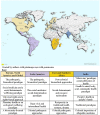Engaging globally with how to achieve healthy societies: insights from India, Latin America and East and Southern Africa
- PMID: 33883188
- PMCID: PMC8061839
- DOI: 10.1136/bmjgh-2021-005257
Engaging globally with how to achieve healthy societies: insights from India, Latin America and East and Southern Africa
Abstract
The way healthy societies are conceptualised shapes efforts to achieve them. This paper explores the features and drivers of frameworks for healthy societies that had wide or sustained policy influence post-1978 at global level and as purposively selected southern regions, in India, Latin America and East and Southern Africa. A thematic analysis of 150 online documents identified paradigms and themes. The findings were discussed with expertise from the regions covered to review and validate the findings.Globally, comprehensive primary healthcare, whole-of-government and rights-based approaches have focused on social determinants and social agency to improve health as a basis for development. Biomedical, selective and disease-focused technology-driven approaches have, however, generally dominated, positioning health improvements as a result of macroeconomic growth. Traditional approaches in the three southern regions previously mentioned integrated reciprocity and harmony with nature. They were suppressed by biomedical, allopathic models during colonialism and by postcolonial neoliberal economic reforms promoting selective, biomedical interventions for highest-burden diseases, with weak investment in public health. In all three regions, holistic, sociocultural models and claims over natural resources re-emerged. In the 2000s, economic, ecological, pandemic crises and social inequality have intensified alliances and demand to address global, commercial processes undermining healthy societies, with widening differences between 'planetary health', integrating ecosystems and collective interests, and the coercive controls and protectionism in technology-driven and biosecurity-driven approaches.The trajectories point to a need for ideas and practice on healthy societies to tackle systemic determinants of inequities within and across countries, including to reclaim suppressed cultures; to build transdisciplinary, reflexive and participatory forms of knowledge that are embedded in and learn from action; and to invest in a more equitable circulation of ideas between regions in framing global ideas. Today's threats raise a critical moment of choice on which ideas dominate, not only for health but also for survival.
Keywords: health policy; health systems; public health; review.
© Author(s) (or their employer(s)) 2021. Re-use permitted under CC BY-NC. No commercial re-use. See rights and permissions. Published by BMJ.
Conflict of interest statement
Competing interests: None declared.
Figures
Similar articles
-
The 2023 Latin America report of the Lancet Countdown on health and climate change: the imperative for health-centred climate-resilient development.Lancet Reg Health Am. 2024 Apr 23;33:100746. doi: 10.1016/j.lana.2024.100746. eCollection 2024 May. Lancet Reg Health Am. 2024. PMID: 38800647 Free PMC article. Review.
-
Australia in 2030: what is our path to health for all?Med J Aust. 2021 May;214 Suppl 8:S5-S40. doi: 10.5694/mja2.51020. Med J Aust. 2021. PMID: 33934362
-
[The Third World before the Third World, 1770-1870].Tiers Monde. 1992 Jan-Mar;33(129):7-29. Tiers Monde. 1992. PMID: 12285721 French.
-
Tuberculosis.In: Holmes KK, Bertozzi S, Bloom BR, Jha P, editors. Major Infectious Diseases. 3rd edition. Washington (DC): The International Bank for Reconstruction and Development / The World Bank; 2017 Nov 3. Chapter 11. In: Holmes KK, Bertozzi S, Bloom BR, Jha P, editors. Major Infectious Diseases. 3rd edition. Washington (DC): The International Bank for Reconstruction and Development / The World Bank; 2017 Nov 3. Chapter 11. PMID: 30212088 Free Books & Documents. Review.
-
Primary health care in the context of rapid urbanization.Community Dev J. 1983;18(2):104-19. doi: 10.1093/cdj/18.2.104. Community Dev J. 1983. PMID: 12265443
Cited by
-
Ethical Frameworks and Global Health: A Narrative Review of the "Leave No One Behind" Principle.Inquiry. 2024 Jan-Dec;61:469580241288346. doi: 10.1177/00469580241288346. Inquiry. 2024. PMID: 39385394 Free PMC article. Review.
-
What Are Healthy Societies? A Thematic Analysis of Relevant Conceptual Frameworks.Int J Health Policy Manag. 2023;12:7450. doi: 10.34172/ijhpm.2023.7450. Epub 2023 Nov 7. Int J Health Policy Manag. 2023. PMID: 38618792 Free PMC article.
-
Sustainable development goals (SDGs) and resilient healthcare systems: Addressing medicine and public health challenges in conflict zones.Medicine (Baltimore). 2025 Feb 14;104(7):e41535. doi: 10.1097/MD.0000000000041535. Medicine (Baltimore). 2025. PMID: 39960902 Free PMC article. Review.
-
Historicising global nutrition: critical reflections on contested pasts and reimagined futures.BMJ Glob Health. 2021 Nov;6(11):e006337. doi: 10.1136/bmjgh-2021-006337. BMJ Glob Health. 2021. PMID: 34772690 Free PMC article. Review.
-
Wholeness and Interconnection as the Foundation for a New Epistemology of Health.Glob Adv Integr Med Health. 2025 Apr 1;14:27536130251328636. doi: 10.1177/27536130251328636. eCollection 2025 Jan-Dec. Glob Adv Integr Med Health. 2025. PMID: 40177304 Free PMC article.
References
-
- Schmidt B. Hegemony:A conceptual and theoretical analysis. DOC Research Institute, 2018. Available: https://doc-research.org/2018/08/hegemony-conceptual-theoretical-analysis/ [Accessed 7 Dec 2020].
-
- Loewenson R, Villar E, Baru R. Achieving healthy societies - ideas and learning from diverse regions for shared futures. Training and Research Support Centre, 2020. Available: https://www.tarsc.org/publications/documents/Healthy%20societies%20paper... [Accessed 7 Dec 2020].
-
- Maldonado R. Interculturalidad Y políticas públicas en El MARCO del Buen Vivir. Quito: Ministerio de Salud Pública del Ecuador. Salud Interculturalidad y Derechos 2010.
Publication types
MeSH terms
Grants and funding
LinkOut - more resources
Full Text Sources
Other Literature Sources

